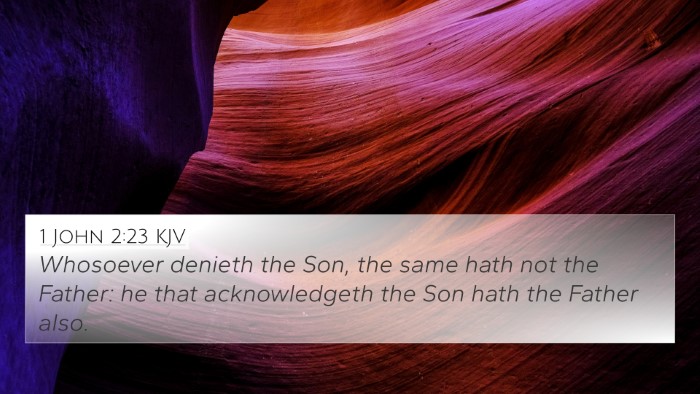Understanding Matthew 10:33
Matthew 10:33 states, "But whosoever shall deny me before men, him will I also deny before my Father which is in heaven." This verse serves as a profound reminder of the consequences of one's stance towards Christ in the presence of others.
Meaning and Explanation
This verse indicates the importance of publicly acknowledging one's faith in Jesus Christ. Those who choose to disavow Him, especially when faced with opposition or peer pressure, are warned that they will face repercussions in their relationship with God.
Insights from Public Domain Commentaries
- Matthew Henry: Henry emphasizes that the denial of Christ is a grave sin. He points out that such denial is not merely silence or indifference but includes active rejection. He elaborates on the societal pressures that may lead to such a denial, encouraging believers to stand firm in their faith.
- Albert Barnes: Barnes suggests that this verse underlines the exclusivity of faith in Christ. He speaks of the relationship between acknowledgment and denial, noting that public recognition of Christ is essential for true discipleship. He warns believers of the final judgment that awaits those who are ashamed of their Savior.
- Adam Clarke: Clarke interprets the verse within the broader context of discipleship, emphasizing the necessity of loyalty and courage in faith. He encourages believers to take heart and stand firm against the world’s opinion, assuring them that such faithfulness will be rewarded.
Cross-References Related to Matthew 10:33
This verse is interconnected with several others throughout the scriptures that emphasize the themes of acknowledgment, witness, and the consequences of denial:
- Luke 12:9: "But he that denieth me before men shall be denied before the angels of God."
- Mark 8:38: "For whosoever shall be ashamed of me and of my words in this adulterous and sinful generation; of him also shall the Son of man be ashamed..."
- John 12:42-43: "Nevertheless among the chief rulers also many believed on him; but because of the Pharisees they did not confess him..."
- Romans 10:9: "That if thou shalt confess with thy mouth the Lord Jesus, and shalt believe in thine heart that God hath raised him from the dead, thou shalt be saved."
- 2 Timothy 2:12: "If we suffer, we shall also reign with him: if we deny him, he also will deny us."
- Hebrews 10:23: "Let us hold fast the profession of our faith without wavering; (for he is faithful that promised;)”
- Revelation 3:5: "He that overcometh, the same shall be clothed in white raiment; and I will not blot out his name out of the book of life, but I will confess his name before my Father, and before his angels."
Thematic Connections
When exploring the thematic connections in Scripture, Matthew 10:33 serves as a pivot point for understanding how various Biblical texts interrelate concerning the acknowledgment of faith:
- The confession of faith as seen in Romans 10:9 parallels the denial discussed here.
- Public witness and its implications are mirrored in Luke 12:9, reinforcing the consequences of denial.
- Theme of spiritual courage connects to Mark 8:38, urging believers not to be ashamed of their faith.
- Final judgment reflected in 2 Timothy 2:12 reiterates the cost of denying Christ.
- Each of these verses contributes to an overarching narrative of the necessity of unwavering faith and the promise of divine acknowledgment.
Tools for Bible Cross-Referencing
To delve deeper into cross-referencing the Bible, believers can utilize a variety of tools:
- Bible Concordance: A comprehensive index that lists scriptures by the words they contain, allowing for easy identification of thematic connections.
- Bible Cross-reference Guide: This tool provides systematic references to similar verses that discuss comparable themes.
- Bible Reference Resources: Various updated materials and online platforms facilitate a deeper study into the rich interconnectivity of Biblical scripture.
Comparative Bible Verse Analysis
Engaging in comparative analysis between this verse and others helps illuminate the teachings of Christ and the broader messages of the Gospel. Tools for cross-referencing Bible study enhance the understanding of the complex dialogues present within the faith.
Conclusion
In summary, Matthew 10:33 serves as a powerful exhortation to uphold one's faith in Jesus Christ, no matter the circumstance. By engaging with related verses and employing cross-referencing tools, believers can gain profound insights into the Christian walk, understanding that public acknowledgment of Christ is essential for an enduring relationship with God.











